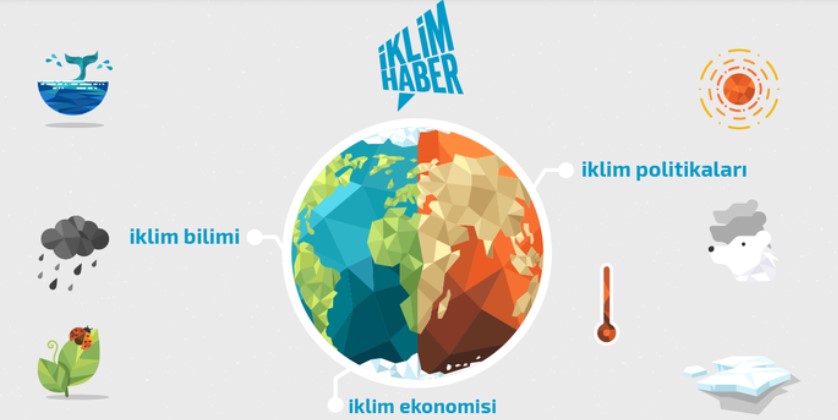Climate Media in Turkey (4): ‘We Believe in the Importance of Creating a Political Change’

'We believe in the importance of creating a political change by appealing to decision-makers, and we are conducting studies that we think can achieve this.' Saying that NGOs are one of the primary sources of news, Bulut Bagatır from Climate News states that they are trying to do more qualified work with the positive feedback they receive from the limited readership of climate journalism.
İklim Haber (Climate News) covers current developments in climate science, climate policies and climate economics with an impartial and data-driven approach. Focusing on addressing climate change with its scientific, economic, and political dimensions, İklim Haber aims to disseminate accurate and impartial information like other media organs operating in the field of climate. In addition, the ‘Perception of Climate Change and Environmental Problems in Turkey’ research, the fourth of which will be prepared this year with KONDA Research, measures the perception of the Turkish public on climate change.
At the end of our Climate Media in Turkey file, we talked to Bulut Bagatır from Iklim Haber about the current situation of climate journalism in Turkey, the unique position of Iklim Haber and its collaborations with civil society.
‘İklim Haber, An Alternative Media Aiming to Disseminate Independent and Data-Driven Information’
How does İklim Haber define itself? How would you describe your mission?
İklim Haber is an alternative media organization that aims to disseminate independent and data-driven information. In general, we share the most up-to-date developments in climate science, policies, and economics. In addition, we are preparing file topics that include 17 Sustainable Development Goals, which are directly related to the climate crisis. Considering the climate crisis, which has turned into one of the biggest crises of our age, is now ‘dead’, we try to explain to policy-makers, academics, the business world and citizens in a way that protects not only people but also nature.
In addition to all these, we measure the perception of the Turkish public on climate change and reveal their views on the ever-deepening climate crisis with the ‘Perception of Climate Change and Environmental Problems in Turkey’ studies, which we have carried out three times with KONDA Research. We are also starting our work on the fourth research soon.
What makes you different from other media that produces content in the field of climate?
As İklim Haber, we believe in the importance of creating a political change by appealing to decision makers, and we carry out studies that we think can achieve this. Although climate journalism broadcasting is extremely limited in Turkey, we should also say that successful works have been produced by different media outlets. Our desire, too, is to carry out different and more qualified works in this field, taking into account that we are very close to reaching the 1.5-degree limit.
The news about the climate crisis in the media is generally made with an approach that we can draw as ‘disaster reporting’ when extreme weather events occur. The reasons behind that disaster are hardly mentioned.
Are there enough media outlets in Turkey that specialize in the field of climate or produce content on climate?
Unfortunately, no. Just as there are not enough media outlets, there are also not enough reporters or editors working in this field. The news about the climate crisis in the media is generally made with an approach that we can draw as ‘disaster reporting’ when extreme weather events occur. The reasons behind that disaster are hardly mentioned. By knowingly or unknowingly, wrong connections are made, muddying the water and the work is moved to another point.
When you look at the news about the climate crisis in the mainstream media, you can see that the photos of polar bears on almost completely melted ice are still used. Yes, the climate crisis threatens the polar bear’s environment and species. However, it is not only the problem of that species, on the contrary, but it also threatens the environment we live in, nature and us. The climate crisis is a global threat, and we need to start our struggle locally.
‘Climate Journalism is Guiding in the Solution of the Climate Crisis’
Do you think that making news and creating content about climate can also be considered “solution journalism”?
Climate journalism and solution journalism are two fields whose paths intersect by their nature. I think that climate journalism includes solution journalism. Climate journalism is basically a journalism that conveys the solutions to the crisis that the world is currently in and guides. With the successful examples so far, I hope that in time, we will start to see better examples of the intersection of these two journalism genres both in the world and in Turkey.
How do you see the current situation of climate journalism in Turkey? How would you evaluate its impact on public opinion?
Climate News is also struggling with problems such as the capacity and resource problems experienced by most alternative media organizations that do climate reporting. As a matter of fact, no matter how meticulous, climate science-based and data-driven news we make, our content can reach a certain readership. Despite this, positive feedback from our target audience, decision makers, academics, the private sector, and citizens, encourages us even more and supports us to make more efforts to overcome the difficulties we are currently experiencing.
Is there a network in Turkey that brings together content creators on climate and environmental issues? If not, why? Do you think such a network should exist?
Currently, there is no such network in Turkey. As İklim Haber, we are part of the international network Covering Climate Now (CCN). I attribute one of the biggest reasons why such a network has not been established until now is the small number of institutions working in this field. This does not mean that we have no communication with others. However, we are happy to support and join the establishment of such a network in Turkey in order to share knowledge under a more institutional structure and to reverse the situation described as ‘climate silence’ by CCN founding director Mark Hertsgaard.
I would also like to state that Iklim Haber is always open to similar collaborations. Let’s also announce that we, as the Climate News team, will start a program in cooperation with Açık Radyo, starting next week.
‘NGOs Are Among Our Primary News Sources’
Do you have cooperation and communication studies with NGOs (global, national, and local) working in the field of climate? To what extent do you involve civil society in the formation of your editorial policy and content?
We are in close communication with the NGOs at all the levels you mentioned. NGOs are among our primary sources of news. They are an important factor in our making comprehensive and qualified news, from the opinions shared by their experts to the information they provide on the climate struggle in any corner of Turkey.
Which institutions and individuals do you follow who produce content in the field of climate in Turkey?
I can say that we try to follow almost everyone who produces content in this field.
‘Generation Z wants to secure its future with the concern of existence.’
Do you see a difference in climate between generations? Can it be said that the interest and awareness of the Z generation on the climate crisis is high?
Generation Z is very aware of the climate crisis because they do not want their future to be ruined by the destruction caused by the generations before them. They demand a sustainable life, rather than living the consequences of a past in which they were never involved.
According to a new global study, about six in 10 young people aged 16 to 25 are very or extremely concerned about climate change and do not find government action sufficient. Generation Z wants to secure its future with the concern of existence and demands an immediate and urgent struggle in the face of a crisis that continues at this speed. That’s exactly why they’re going on climate strikes globally, making a strong statement to listen to what science has to say and act now.
You can find the other articles of the file named Climate Media in Turkey here.

Bizi Takip Edin